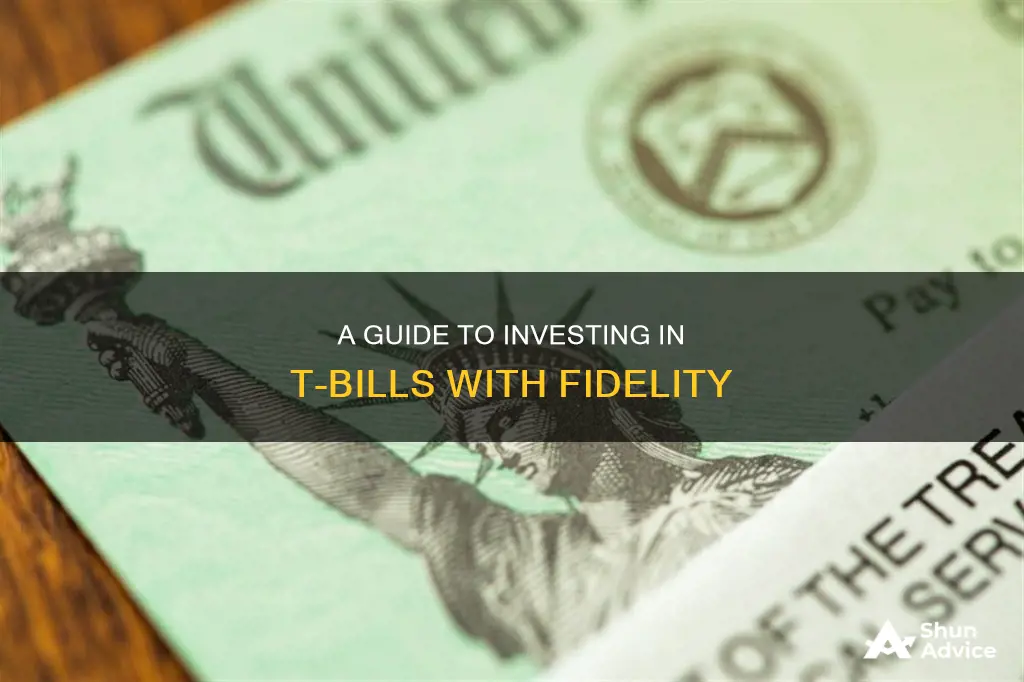
Treasury bills, or T-bills, are a type of US government bond with a maturity of one year or less. They are considered low-risk investments as they are backed by the full faith and credit of the US government. T-bills are sold at a discount to their face value and investors receive the full face value at maturity. This difference represents the total interest paid in one lump sum. T-bills can be purchased on Fidelity, with no fees or commissions charged for online trading. This paragraph provides an introduction to the topic of investing in T-bills through the Fidelity platform, covering the nature of T-bills, their associated risks and returns, and the process of buying and selling them on Fidelity.
What You'll Learn

How to buy T-bills on Fidelity
T-bills, or Treasury bills, are considered a low-risk investment as they are backed by the US government. They are sold at a discount to their face value and mature in one year or less.
If you want to invest in T-bills on Fidelity, follow these steps:
- Log in to your Fidelity account.
- Expand the "News & Research" tab and select "Fixed Income, Bonds & CDs".
- Click on the "New Issues" tab and select "Treasury" to view the available options.
- Review the auction schedule to look for future offerings.
- Decide whether you want to buy newly issued T-bills or existing T-bills on the secondary market. Newly issued T-bills are offered at regularly scheduled auctions held by the US Treasury, while existing T-bills can be purchased immediately on the secondary market.
- If you choose to buy newly issued T-bills, you can purchase them on Fidelity.com between 2:00 and 3:00 p.m. ET on the Announcement date.
- When purchasing new issue T-bills, Fidelity will set aside the cash in a "Cash Committed to Open Orders" balance, where you will continue to accrue interest until the issue date.
- To place your order, click on "Buy" in Fidelity, then click on "More Quotes - Depth of Book and Recent Trades" to access different quotes for the specific bond you want.
- You can buy T-bills in increments of $1,000.
- Note that Fidelity will only accept orders from 8 AM to 5 PM Eastern Time on weekdays.
- If you choose to buy existing T-bills on the secondary market, you will receive a quote with the price you will pay and the yield you will receive.
- You can also sell T-bills on the secondary market before maturity. You will receive the market price, which may be more or less than the face value or what you originally paid.
- Selling T-bills on the secondary market requires you to enter a limit price and a quantity that a buyer is willing to purchase.
- If you need assistance, you can reach out to Fidelity's Fixed Income team, who are available by phone from Monday to Friday, 8:00 a.m. to 8:00 p.m. ET.
Leveraged Index Funds: Risky or Rewarding Investment Strategy?
You may want to see also

The pros and cons of buying T-bills
Treasury bills, or T-bills, are short-term debt obligations issued by the US Department of the Treasury. They are considered safe investments because they are backed by the full faith and credit of the US government. T-bills are sold at a discount from their face value and mature at face value. The difference between the purchase price and the maturity value is the interest earned by the investor.
Pros:
- T-bills have zero default risk since they are backed by the US government.
- T-bills offer a low minimum investment requirement of $100.
- Interest income from T-bills is exempt from state and local income taxes (but subject to federal income taxes).
- Investors can buy and sell T-bills easily in the secondary bond market.
- T-bills are a good option for investors looking for a safe and secure investment with a short-term maturity.
- T-bills are one of the safest places to save your money, making them a great fit for conservative investors who want to earn interest while avoiding risk.
Cons:
- T-bills offer low returns compared to other debt instruments.
- T-bills do not pay any interest payments before maturity.
- T-bills can inhibit cash flow for investors who require steady income.
- T-bills have interest rate risk, so their rate could become less attractive in a rising-rate environment.
- If sold early, there could be a gain or loss depending on where bond prices are trading at the time of the sale. The sale price of the T-bill could be lower than the original purchase price.
DSP Blackrock Tax Saver Fund: Worth Investing?
You may want to see also

T-bills vs other bonds
T-bills, or Treasury bills, are short-term debt obligations issued by the US government. They mature in one year or less and are considered low-risk investments because they are backed by the government. T-bills are sold at a discount to their face value, and investors receive the full face value when the bill matures. This is how the "interest" on T-bills is paid out, and it only happens at the end of the term.
Treasury bonds, or T-bonds, are long-term debt obligations that mature in terms of 20 or 30 years. They are the opposite of T-bills in terms of maturity and typically offer the highest yields among T-bills, T-bonds, and Treasury notes. T-bonds pay interest every six months until maturity, at which point investors receive the bond's face value.
Treasury notes, or T-notes, have mid-range maturities ranging from two to ten years. Like T-bonds, they pay interest every six months.
All three types of securities are considered low-risk and highly liquid investments, backed by the US government. However, their different maturities significantly influence how they react to market conditions and how investors use them. Generally, the longer the maturity, the more sensitive the security is to interest rate changes, and the higher the yield.
T-bills are often used for short-term cash management or as a near-cash holding in a portfolio, while T-notes and T-bonds are more commonly used for longer-term investing, income generation, or as a hedge against stock market volatility.
In terms of tax advantages, interest income from T-bills, T-bonds, and T-notes is exempt from state and local income taxes but is subject to federal income taxes.
A Guide to Index Fund Investing in Malaysia
You may want to see also

Selling T-bills on the secondary market
T-bills can be sold before maturity on the secondary market. The price received may be more or less than the face value or the original purchase price. The market price is reflected on the "Positions" page and will be what is received if the T-bill is sold before maturity.
When selling T-bills on the secondary market, a limit price and a quantity that a buyer is willing to purchase must be entered. If the Depth of Book does not have any orders that meet the parameters at the time the order is placed, it will remain open until a buyer agrees to the purchase at the specified price and quantity.
There are no fees or commissions charged online when trading U.S. Treasuries, including auction and secondary issues. However, a $19.95 commission is charged to the account if a representative places the trade. When trading secondary issues for other bonds and Certificates of Deposits (CDs), there is a $1 markup per bond purchased online.
There are some disadvantages to buying on the secondary market. While new issues can always be purchased with a minimum of $1,000 face value, sometimes a T-bill on the secondary market requires a minimum order size of $50,000 or $100,000 face value. This depends on the broker used.
Another disadvantage is the bid/ask spread. When buying on the secondary market, a slightly higher price is paid than the true price. The difference between the price paid when buying and the price received when selling is the bid/ask spread.
Additionally, buying T-bills on the secondary market in a taxable account can add tax complications. However, buying or selling on the secondary market in an IRA does not affect taxes.
Lastly, when buying on the secondary market, orders must be placed when the bond market is open. This is typically Monday through Friday, 8:00 a.m. to 5:00 p.m. Eastern Time.
Vanguard Real Estate Index Fund: Closed or Open?
You may want to see also

T-bills and taxes
T-bills, or Treasury bills, are short-term debt obligations that are backed by the full faith and credit of the US government. They are considered low-risk investments because the likelihood of the US government defaulting on debt obligations is very low.
When it comes to taxes, interest earned on T-bills is exempt from taxation at the state and local level but is fully taxable at the federal level. This means that while you don't have to pay state or local taxes on the interest you earn from T-bills, you do have to pay federal taxes on that income.
At the end of each tax year, owners of T-bills should receive a Form 1099-INT from the Department of Treasury, which details the amount of interest earned on the securities for the year. This information is also filed with the Internal Revenue Service (IRS). The interest income received is recorded on Form 1099-INT and must be reported on your federal tax return, Form 1040. The interest is taxed at your marginal tax rate.
If you buy a T-bill and sell it for a profit, the profit will be taxable as a capital gain if you hold it for more than one year. If you hold it for less than a year, the profit is taxed at your income tax rate.
To simplify paying federal taxes on T-bills, you can opt to have up to 50% of your interest earnings automatically withheld. The Treasury will then transfer the withholdings to the IRS and report the amount on the 1099-INT form.
Compared to other short-term fixed-income assets, such as certificates of deposit (CDs), T-bills can offer a tax advantage, especially for investors living in high-income-tax states. While interest earned on T-bills is exempt from state and local taxes, CDs are fully taxable at both the state and federal levels.
In summary, while T-bills offer a tax advantage at the state and local level, any interest income or profits from the sale of T-bills are subject to federal taxes. Be sure to consult with a tax professional for specific guidance on how T-bills may impact your tax situation.
Growth Funds: Why You Should Invest Now
You may want to see also
Frequently asked questions
You can buy Treasury Bills on Fidelity.com between 2:00 and 3:00 p.m. ET on the Announcement date. Once they are listed online, you can indicate your interest for a specific security until the Auction date at 10:00 a.m. Treasury Bills are sold in increments of $1000.
There are no fees or commissions charged online for trading U.S. Treasuries, including auction and secondary issues. However, if a representative places the trade on your behalf, a $19.95 commission is charged to your account.
Yes, you can sell Treasury Bills on the secondary market before maturity. You will receive the market price, which may be more or less than the face value or what you originally paid.
The minimum investment for Treasury Bills is $1000.







